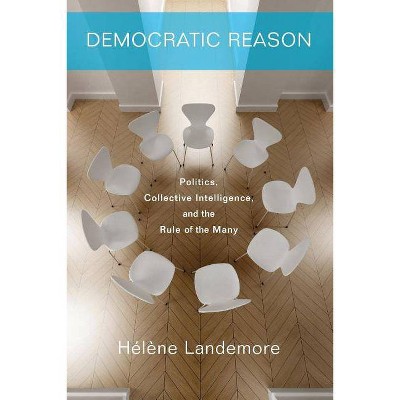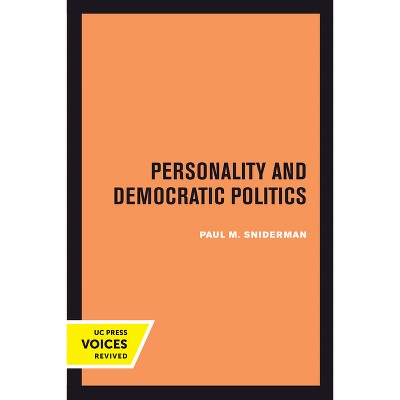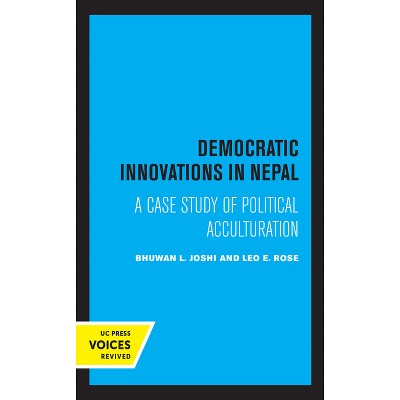Sponsored

Democratic Institution Performance - by Edward R McMahon & Thomas Sinclair (Hardcover)
In Stock
Sponsored
About this item
Highlights
- How do nations make successful transitions to democracies?
- About the Author: EDWARD R. MCMAHON is Dean's Professor of Applied Politics and Director, Center on Democratic Performance, Department of Political Science, State University of New York, Binghamton.
- 280 Pages
- Political Science, Political Ideologies
Description
About the Book
How do nations make successful transitions to democracies? Our understanding of how democracy functions--and under what circumstances it can be consolidated and strengthened--remains highly uneven. Recent events underscore the critical importance of expanding our understanding of democratic institutions and operations. Here McMahon and his distinguished contributors demonstrate how the dynamic process of democratization is shaped by the specific contexts in which it occurs; how the internal community plays a key role in the development of democracy; and how the ability to understand democratization requires both internal and external perspectives.
The contributors seek to improve the definitions of what constitutes a democracy and to determine how the effectiveness of democratic institutions might best be judged in order to better serve the analysis of and policy approaches to building democratic institutions. With fewer overtly authoritarian states in the post-Cold War world, a wealth of raw information and experience has begun to accumulate. Our understanding of democratic institutional performance requires us to look closely at the performance of the institutions themselves. The book contains chapters on public opinion, civil society, domestic institutions of governance, elections, globalization, international standards of democratic development, international assistance and academic research. A concluding chapter summarizes what democratization processes can teach us about democracy in a broader context.
Book Synopsis
How do nations make successful transitions to democracies? Our understanding of how democracy functions--and under what circumstances it can be consolidated and strengthened--remains highly uneven. Recent events underscore the critical importance of expanding our understanding of democratic institutions and operations. Here McMahon and his distinguished contributors demonstrate how the dynamic process of democratization is shaped by the specific contexts in which it occurs; how the internal community plays a key role in the development of democracy; and how the ability to understand democratization requires both internal and external perspectives.
The contributors seek to improve the definitions of what constitutes a democracy and to determine how the effectiveness of democratic institutions might best be judged in order to better serve the analysis of and policy approaches to building democratic institutions. With fewer overtly authoritarian states in the post-Cold War world, a wealth of raw information and experience has begun to accumulate. Our understanding of democratic institutional performance requires us to look closely at the performance of the institutions themselves. The book contains chapters on public opinion, civil society, domestic institutions of governance, elections, globalization, international standards of democratic development, international assistance and academic research. A concluding chapter summarizes what democratization processes can teach us about democracy in a broader context.Review Quotes
?[t]he volume has to be considered for it provides consideration on how lessons gleaned from support for civil society in democratization contexts actually function in practice. This makes the McMahon and Sinclair edited volume useful not only for academicians but also for practitioners.?-Democratization
?[A]ll the different aspects of democracy building are presented in depth. The presentations are always clear and well structured. The chapters are functional for scholars as they present and discuss a rich range of concept defintions ... but also for the copious references and for adequate and well-chosen case studies. Furthermore, what seems even more valuable about this volume is the fact that the authors dare to give an account of the facts with a critical perspective of the mainstream democratization literature ...?-Democratization
"Ýt¨he volume has to be considered for it provides consideration on how lessons gleaned from support for civil society in democratization contexts actually function in practice. This makes the McMahon and Sinclair edited volume useful not only for academicians but also for practitioners."-Democratization
"ÝA¨ll the different aspects of democracy building are presented in depth. The presentations are always clear and well structured. The chapters are functional for scholars as they present and discuss a rich range of concept defintions ... but also for the copious references and for adequate and well-chosen case studies. Furthermore, what seems even more valuable about this volume is the fact that the authors dare to give an account of the facts with a critical perspective of the mainstream democratization literature ..."-Democratization
"[t]he volume has to be considered for it provides consideration on how lessons gleaned from support for civil society in democratization contexts actually function in practice. This makes the McMahon and Sinclair edited volume useful not only for academicians but also for practitioners."-Democratization
"[A]ll the different aspects of democracy building are presented in depth. The presentations are always clear and well structured. The chapters are functional for scholars as they present and discuss a rich range of concept defintions ... but also for the copious references and for adequate and well-chosen case studies. Furthermore, what seems even more valuable about this volume is the fact that the authors dare to give an account of the facts with a critical perspective of the mainstream democratization literature ..."-Democratization
About the Author
EDWARD R. MCMAHON is Dean's Professor of Applied Politics and Director, Center on Democratic Performance, Department of Political Science, State University of New York, Binghamton.
THOMAS SINCLAIR is Director and Assistant Professor of the Master in Public Administration Program, State University of New York, Binghamton.Shipping details
Return details
Trending Non-Fiction











